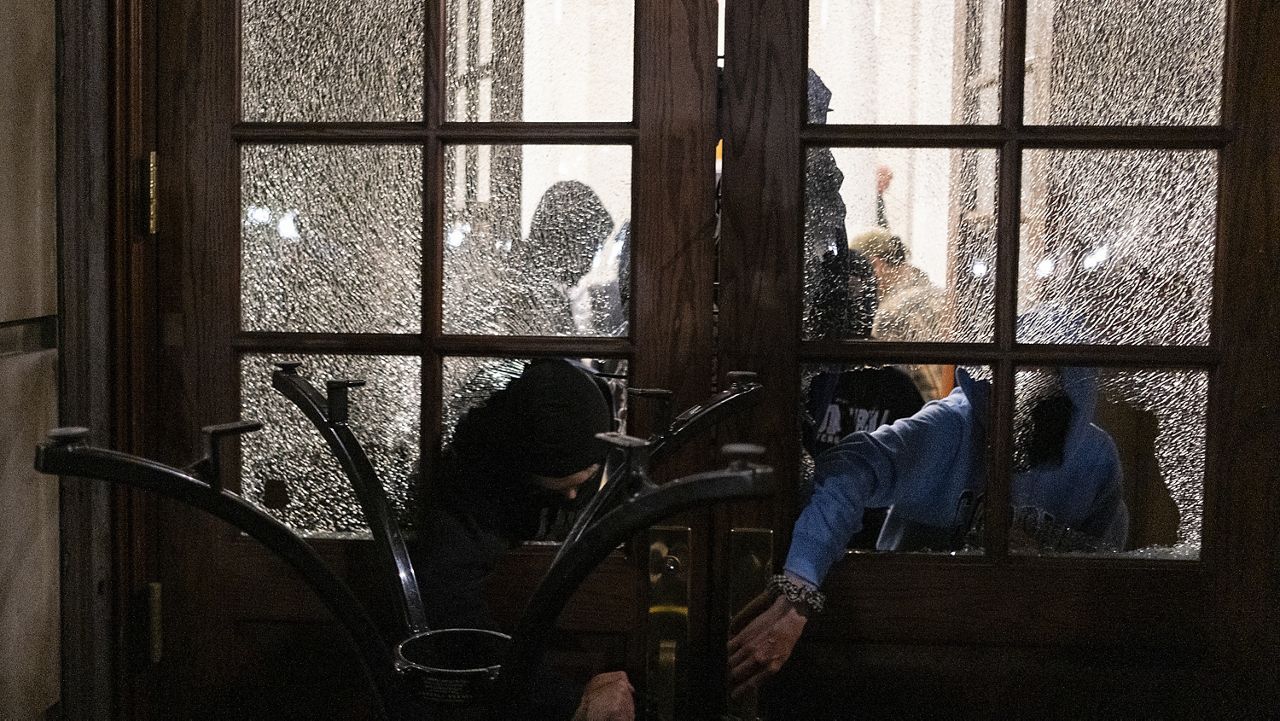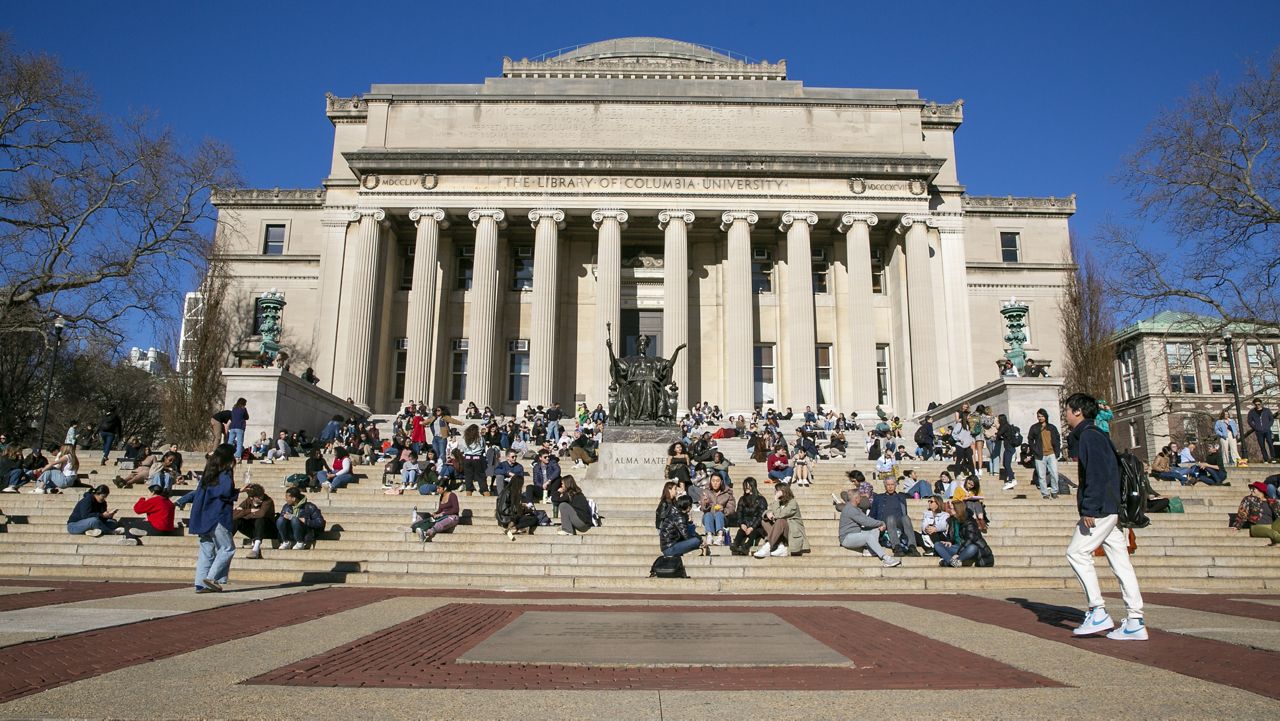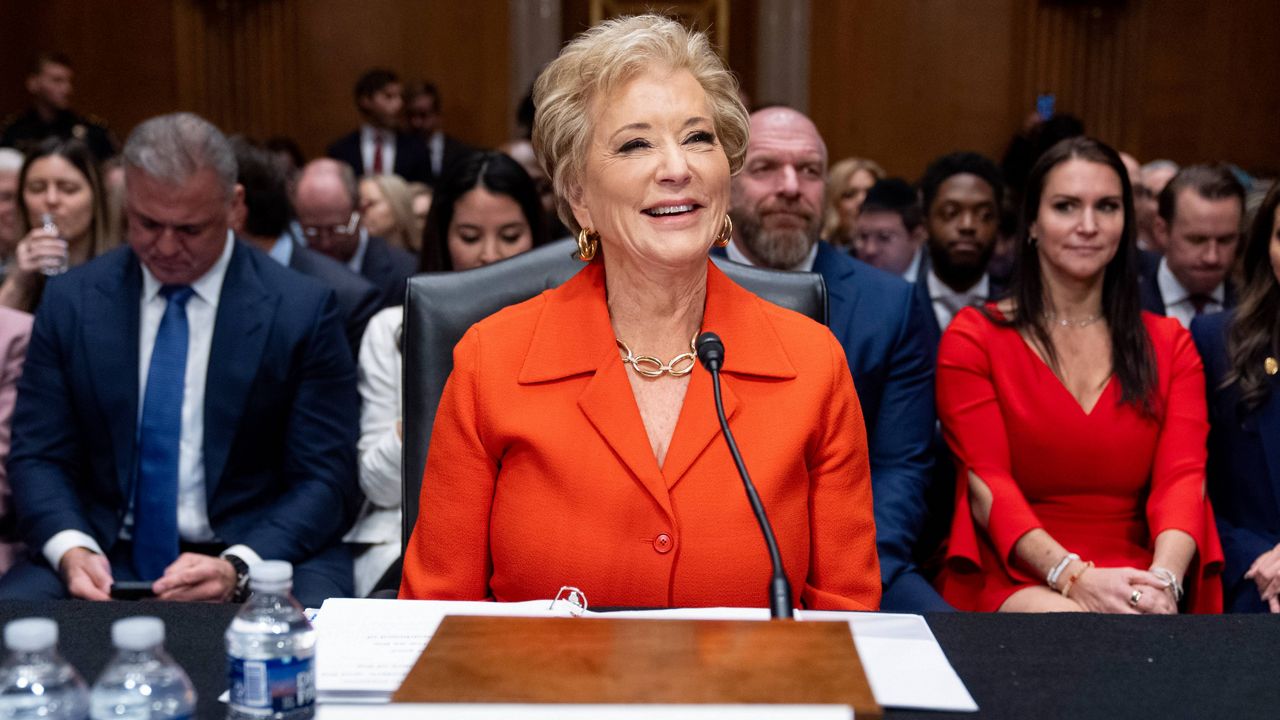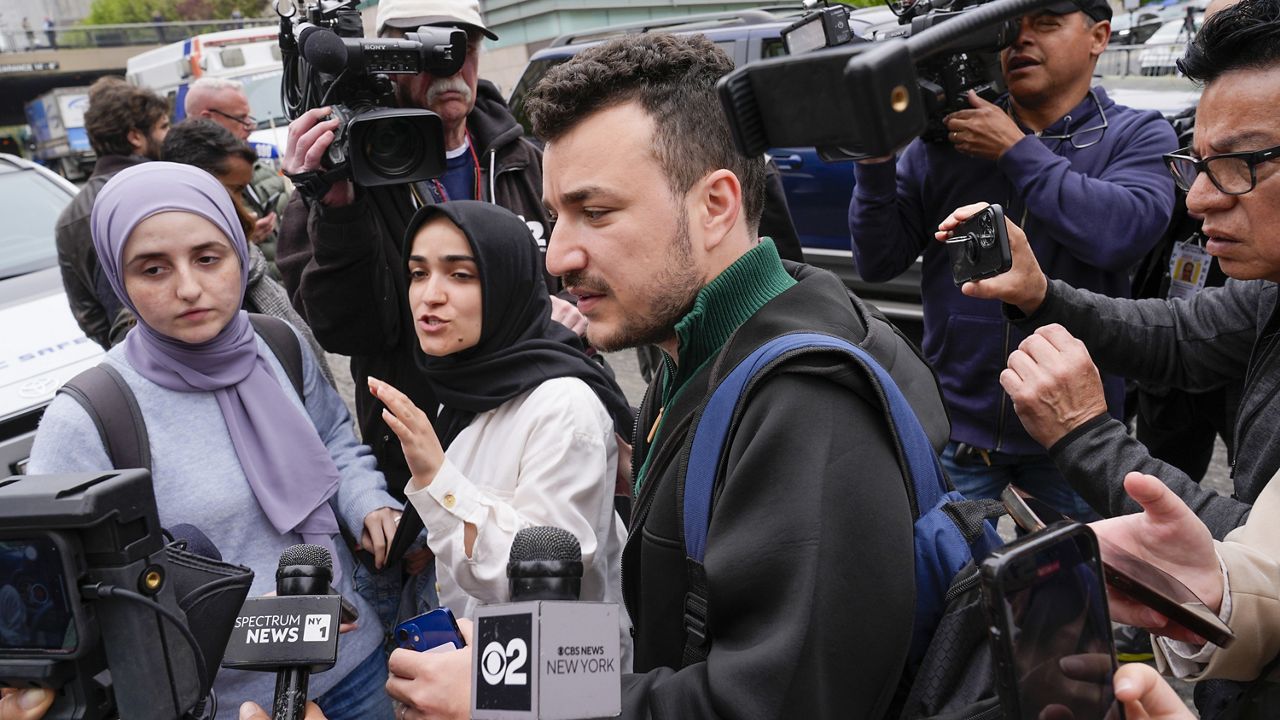Dozens of protesters took over a building at Columbia University in New York early Tuesday, barricading the entrances and unfurling a Palestinian flag out of a window in an escalation city officials are claiming was facilitated by “outside agitators.”
At an evening press briefing, NYPD Deputy Commissioner of Intelligence and Counterterrorism Rebecca Weiner displayed video and images that she said showed protesters on Columbia’s Manhattan campus breaking windows, chaining themselves together to try to prevent entry to the building, and carrying furniture and metal barricades to the building.
She said the video displayed an “evolution and change in tactics,” and showed “the presence of external folks who are not affiliated with [the] school.”
“This is far beyond First Amendment-protected speech and peaceful protest, which has been a key element of some of these things over the last few months,” Weiner said.
According to Weiner, some people involved are known to police, and others were identified by university officials as “unaffiliated with campus.”
Officials at the briefing urged students in the building to leave and suggested that parents reach out to their children to get them to leave.
“Maybe some of the students involved don’t understand what they are involved in. We urge those and everyone else violating Columbia’s order to leave the area and leave the area now,” Mayor Eric Adams said at the briefing. “If you are a parent or guardian of a student, please call your child and urge them to leave the area before the situation escalates in any way.”
Posts on an Instagram page for protest organizers shortly after midnight urged people to protect the encampment and join them at the building.
“An autonomous group reclaimed Hind’s Hall, previously known as 'Hamilton Hall,' in honor of Hind Rajab, a martyr murdered at the hands of the genocidal Israeli state at the age of six years old,” student-led coalition Columbia University Apartheid Divest posted to the platform formerly known as Twitter early Tuesday.
As of Tuesday evening, the NYPD has not been asked to enter the campus, but Weiner said the NYPD is in “constant dialogue” with Columbia officials and is “fully prepared to respond.”
Deputy Commissioner Kaz Daughtry said if the NYPD is invited in, individuals inside the occupied building will be charged with “burglary in a third degree, criminal mischief and trespassing,” while individuals at the encampment will be charged with “trespassing and disorderly conduct.”
In the post, protesters said they planned to remain at the hall until the university conceded to the CUAD's three demands: divestment, financial transparency and amnesty.
Columbia's student radio station, WKCR-FM, broadcast a play-by-play of the hall’s takeover, which occurred nearly 12 hours after Monday’s 2 p.m. deadline for the protesters to leave an encampment of around 120 tents or face suspension.
In a message posted to the public safety section of its website, Columbia University said it was limiting access to the Morningside Heights campus to students who reside in Carman, Furnald, John Jay, Hartley, Wallach, East Campus and Wien. Employees who provide essential services to campus buildings, labs and residential student life will also be allowed access.
The sole access point into and out of the campus is the West 116th Street and Amsterdam gate. All other entry points are closed, the university said.
“This access restriction will remain in place until circumstances allow otherwise,” the message reads.
In a statement released Tuesday afternoon, Columbia spokesperson Ben Chang said the students occupying Hamilton Hall “face expulsion.”
“We made it very clear yesterday that the work of the University cannot be endlessly interrupted by protesters who violate the rules. Continuing to do so will be met with clear consequences," Chang’s statement reads, in part. “Protesters have chosen to escalate to an untenable situation – vandalizing property, breaking doors and windows, and blockading entrances – and we are following through with the consequences we outlined yesterday.”
Chang reiterated that students who did not commit to leave the encampment peacefully and abide by university policies “are now being suspended.”
Students who are suspended will be barred from academic and recreational spaces on campus, with access limited to their residences, he said. Seniors, meanwhile “will be ineligible to graduate.”
“This is about responding to the actions of the protesters, not their cause,” he said. “As we said yesterday, disruptions on campus have created a threatening environment for many of our Jewish students and faculty and a noisy distraction that interferes with teaching, learning, and preparing for final exams, and contributes to a hostile environment in violation of Title VI.”
Hours later, in a conference call with reporters, Chang said the university was "exploring options to restore safety and order" to the campus.
Addressing the media outside Hamilton Hall Tuesday afternoon, one student said the takeover represented "a victory for the students, who stand on the right side of history."
"Our necessary escalation was in response to the repression from our administration, but nonetheless, we were victorious," the student said. "In response to our victory, Columbia has decided to threaten us again, as if we still care about suspension. It puts its own students under siege."
Another student spoke about Hind, the 6-year-old referenced in the CUAD’s social media post.
The New York Times reported that the Palestinian girl was found dead in Gaza in February, citing an aid group who said she and two people it sent to rescue her from a trapped vehicle had been killed by Israeli fire.
Hamilton Hall has been occupied by Columbia University students multiple times, dating back to 1968 when demonstrators seized the building over the Vietnam War, racism and the university’s plans to build a new gymnasium in Morningside Park.
The building was seized again by students in 1985, when they demanded the university divest from companies seen as aiding and abetting the apartheid regime in South Africa, and in 1992, when students protested the school’s plans to turn the Audubon Theater and Ballroom — the building in which Malcom X was assassinated — into a biomedical research complex.
At an unrelated news briefing late Tuesday morning, NYPD Chief of Department Jeffrey Maddrey said the agency was in contact with the university about the protest.
"As of right now, the NYPD is always ready, but we will not be going onto Columbia’s property without a specific request from them, or not unless there is imminent danger, imminent emergency where we have to go on the property,” Maddrey said. “And as of right now, we do not have that request.”
At his weekly news briefing with the New York City press, Mayor Eric Adams echoed NYPD leadership, vowing to offer police support to the university if the school called for it.
“I believe it's imperative that we continue to coordinate with our [university] presidents," Adams said. "We're going to respect their right to determine when they want police involvement, and when they ask us, we’re going to carry out the necessary exercises to do it with the minimum amount of force to not in any way harm faculty, students or the law enforcement personnel."
Adams said the NYPD would brief him later in the day on the latest regarding the protests, adding that he planned to speak with university officials about what the next steps should look like.
On Tuesday morning, Columbia University senior Braeden Bellmar told NY1's Alyssa Paolicelli he would prefer that student protesters and university leadership open up lines of communication with one another again.
“My personal take is I wish we could just kind of come together. It's been super divisive. As for [Hamilton Hall], it looks like they're breaking stuff in there. That’s not my thing, so we’ll see how it ends,” Bellmar said.
“I think they should talk to them, that’s been the biggest thing, trying to keep conversations going to make it as peaceful as it can be,” he added.
Nick Baum, a freshman at the university, said he was shocked when the college advised students who did not live directly on campus to avoid the Morningside Heights campus.
"I never would have ever would have predicted that, as a Jewish student at Columbia's joint degree program with the Jewish Theological Seminary, that there would come a day when I would not even be allowed on campus," Baum said. "But right now we're seeing, after students have barricaded themselves and hijacked Hamilton Hall, that I'm not even allowed on campus. And I think some of that is owed to the fact that Columbia doesn't believe that they can secure my safety. And so that's a serious problem for the administration.”
White House National Security Council spokesman John Kirby on Tuesday called the Hamilton Hall takeover “unacceptable,” adding that it was “not an example of a peaceful protest.”
“Students paying to go to school and want an education aren’t going to be able to do that without disruption, and they ought to be able to do it and feel safe doing it,” Kirby said at a briefing.
U.S college protests spread
Universities across the U.S. are grappling with how to clear out encampments as commencement ceremonies approach, with some continuing negotiations and others turning to force and ultimatums that have resulted in clashes with police. Dozens of people were arrested Monday during protests at universities in Texas, Utah and Virginia, while Columbia said hours before the takeover of Hamilton Hall that it had started suspending students.
Demonstrators are sparring over the Israel-Hamas war and its mounting death toll, and the number of arrests at campuses nationwide is approaching 1,000 as the final days of class wrap up. The outcry is forcing colleges to reckon with their financial ties to Israel, as well as their support for free speech. Some Jewish students say the protests have veered into antisemitism and made them afraid to set foot on campus.
At the University of Texas at Austin, an attorney said at least 40 demonstrators were arrested Monday. The confrontation was an escalation on the 53,000-student campus in the state's capital, where more than 50 protesters were arrested last week.
Later Monday, dozens of officers in riot gear at the University of Utah sought to break up an encampment outside the university president’s office that went up in the afternoon. Police dragged students off by their hands and feet, snapping the poles holding up tents and zip-tying those who refused to disperse. Seventeen people were arrested. The university says it’s against code to camp overnight on school property and that the students were given several warnings to disperse before police were called in.
The plight of students who have been arrested has become a central part of protests, with the students and a growing number of faculty demanding amnesty for protesters. At issue is whether the suspensions and legal records will follow students through their adult lives.
The Texas protest and others — including in Canada and Europe — grew out of Columbia's early demonstrations that have continued. On Monday, student activists defied the 2 p.m. deadline to leave the encampment. Instead, hundreds of protesters remained. A handful of counter-demonstrators waved Israeli flags, and one held a sign reading, “Where are the anti-Hamas chants?”
While the university didn’t call police to roust the demonstrators, school spokesperson Ben Chang said suspensions had started but could provide few details. Protest organizers said they were not aware of any suspensions as of Monday evening.
Columbia’s handling of the demonstrations also has prompted federal complaints.
A class-action lawsuit on behalf of Jewish students alleges a breach of contract by Columbia, claiming the university failed to maintain a safe learning environment, despite policies and promises. It also challenges the move away from in-person classes and seeks quick court action requiring Columbia to provide security for the students.
Meanwhile, a legal group representing pro-Palestinian students is urging the U.S. Department of Education’s civil rights office to investigate Columbia’s compliance with the Civil Rights Act of 1964 for how they have been treated.
A university spokesperson declined to comment on the complaints.
In a rare case, Northwestern University said it reached an agreement with students and faculty who represent the majority of protesters on its campus near Chicago. It allows peaceful demonstrations through the June 1 end of spring classes and in exchange, requires removal of all tents except one for aid, and restricts the demonstration area to allow only students, faculty and staff unless the university approves otherwise.
At the University of Southern California, organizers of a large encampment sat down with university President Carol Folt for about 90 minutes on Monday. Folt declined to discuss details but said she heard the concerns of protesters and talks would continue Tuesday.
USC sparked a controversy April 15 when officials refused to allow the valedictorian, who has publicly supported Palestinians, to make a commencement speech, citing nonspecific security concerns for their rare decision. Administrators then scrapped the keynote speech by filmmaker Jon M. Chu, who is an alumnus, and declined to award any honorary degrees.
The backlash, as well as Columbia's demonstrations, inspired the encampment and protests on campus last week where 90 people were arrested by police in riot gear. The university has canceled its main graduation event.
Administrators elsewhere tried to salvage their commencements and several have ordered the clearing of encampments in recent days. When those efforts have failed, officials threatened discipline, including suspension, and possible arrest.
But students dug in their heels at other high-profile universities, with standoffs continuing at Harvard, the University of Pennsylvania, Yale and others. Police in riot gear at Virginia Commonwealth University sought to break up an encampment there late Monday and clashed with protesters.







